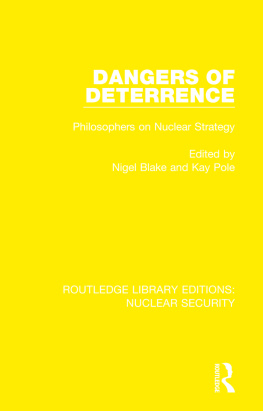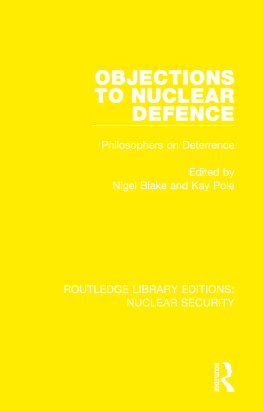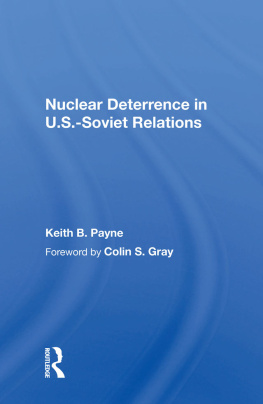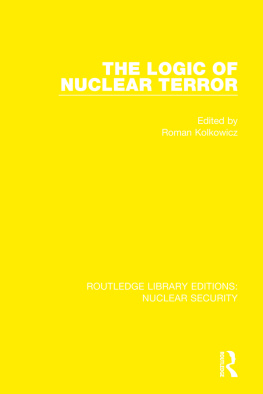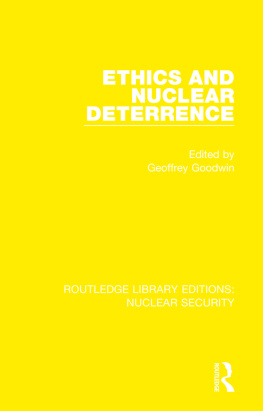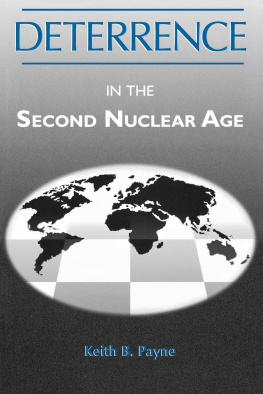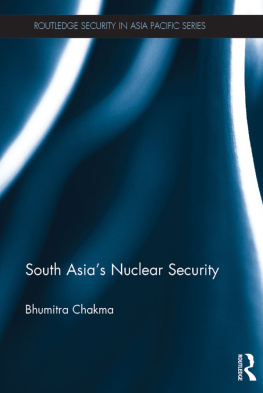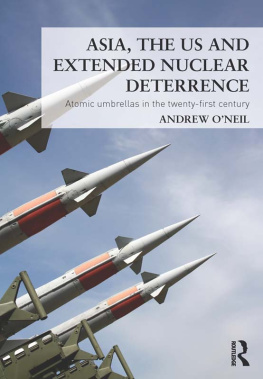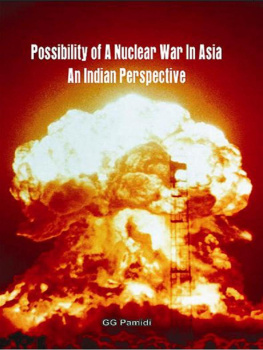ROUTLEDGE LIBRARY EDITIONS: NUCLEAR SECURITY
Volume 17
DANGERS OF DETERRENCE
First published in 1983 by Routledge & Kegan Paul plc
This edition first published in 2021
by Routledge
2 Park Square, Milton Park, Abingdon, Oxon OX14 4RN
and by Routledge
52 Vanderbilt Avenue, New York, NY 10017
Routledge is an imprint of the Taylor & Francis Group, an informa business
1983 Routledge & Kegan Paul
All rights reserved. No part of this book may be reprinted or reproduced or utilised in any form or by any electronic, mechanical, or other means, now known or hereafter invented, including photocopying and recording, or in any information storage or retrieval system, without permission in writing from the publishers.
Trademark notice: Product or corporate names may be trademarks or registered trademarks, and are used only for identification and explanation without intent to infringe.
British Library Cataloguing in Publication Data
A catalogue record for this book is available from the British Library
ISBN: 978-0-367-50682-7 (Set)
ISBN: 978-1-00-309763-1 (Set) (ebk)
ISBN: 978-0-367-53513-1 (Volume 17) (hbk)
ISBN: 978-1-00-308231-6 (Volume 17) (ebk)
Publishers Note
The publisher has gone to great lengths to ensure the quality of this reprint but points out that some imperfections in the original copies may be apparent.
Disclaimer
The publisher has made every effort to trace copyright holders and would welcome correspondence from those they have been unable to trace.
DANGERS OF DETERRENCE
PHILOSOPHERS ON NUCLEAR STRATEGY
Edited by
Nigel Blake and Kay Pole
First published in 1983
by Routledge & Kegan Paul pic
39 Store Street, London WC1E 7DD, England
9 Park Street, Boston, Mass. 02108, USA
464 St Kilda Road, Melbourne,
Victoria 3004, Australia and
Broadway House, Newtown Road,
Henley-on-Thames, Oxon RG9 1EN, England
Set in Press Roman by Columns, Reading
Printed in Great Britain by
T.J. Press, Padstow
Routledge & Kegan Paul 1983
No part of this book may be reproduced in
any form without permission from the publisher,
except for the quotation of brief
passages in criticism
Library of Congress Cataloging in Publication Data
Dangers of deterrence.
Includes bibliographical references and index.
1. Deterrence Strategy Addresses, essays, lectures.
2. Atomic warfareAddresses, essays, lectures.
I. Blake, Nigel. II. Pole, Kay.
U162.6.D36 1983 355.0217 83-13857
ISBN 0-7100-9885-5
Contents
Nigel Blake and Kay Pole
Mary Midgley
Ken Booth
Jeff McMahan
Barrie Paskins
Nicholas Measor
W.B. Gallie
Guide
Many people, apart from ourselves and our families, have lived with this project for a long time, advising, encouraging and sustaining us. Chiefly, of course, we thank our contributors, whose work it is. They have borne our tight deadlines, heavy editorial requests and administrative efforts with generosity and responded to them with care. We thank, too, those other philosophers whom we approached in November 1981 and who, by their 100 per cent support but havent the time messages, underlined our own belief that an anthology such as this was a necessary addition to the debate on disarmament.
At the more practical level, we relied on the speed and efficiency of our secretary, Margie Talbot, as well as on that of the anonymous secretaries of our contributors. The Institute in which we work was generous to us with its research time, not to mention with the rather more mundane facilities such as photocopying. Other parts of the Open University, notably members of the course team preparing Conflict and Security in the Nuclear Age, have, by their interest and involvement in the same area of concern, been of immense help. Wed like to thank particularly Roger Harrison and Janet Radcliffe Richards in this respect.
For their timely comments and general support, often through difficult periods, we are also indebted to Peter Wright and Greg McLennan of the Open University and to Bob McGowan of the University of Leicester. Lastly, we too have an editor whom wed like to thank Stratford Caldecott of Routledge & Kegan Paul was unfailingly patient and we much appreciated his understanding and practical help.
Ken Booth is Senior Lecturer, Department of International Politics, University College of Wales, Aberystwyth. In 1977 he was Scholar-in-Residence at the U.S. Naval War College, and from 1979 to 1981 was Senior Research Fellow in the Centre for Foreign Policy Studies, Dalhousie University, Canada. He is a member of the International Institute for Strategic Studies and the Royal United Service Institute for Defence Studies. Among his books are Contemporary Strategy: Theories and Policies (co-author), Navies and Foreign Policy, American Thinking about Peace and War (co-editor), and Strategy and Ethnocentrism.
W.B. Gallie is Emeritus Professor of Political Science at the University of Cambridge. His publications include Pierce and Pragmatism (1952), Philosophy and the Historical Understanding (1964) and Philosophers of Peace and War (1978).
Jeff McMahan is Research Fellow in Moral Philosophy at St Johns College, Cambridge, and the author of British Nuclear Weapons: For and Against (1981). He has contributed articles to Ethics, The Bulletin of the Atomic Scientists, and the London Review of Books. He is a member of CND.
Nicholas Measor teaches Philosophy at the University of Leicester, having previously held posts at the Universities of Keele and Oxford. Although he has been engaged for some years in the teaching and study of Practical Ethics this is his first published contribution to the nuclear weapons debate.
Mary Midgley was formerly Senior Lecturer in Philosophy at the University of Newcastle on Tyne. She is the author of Beast and Man (1978) and Heart and Mind (1981), and co-author with Judith Hughes of Womens Choices, The Philosophical Problems of Feminism (1983).
Barrie Paskins is Lecturer in War Studies at Kings College London. His publications include The Ethics of War (with M.L. Dockrill, 1979) and several articles on deterrence. He is one of the authors of the Church of England report The Church and the Bomb (1982).
Nigel Blake is Research Fellow in the Institute of Educational Technology at the Open University. He is a philosopher by training and specializes in philosophy of education. Kay Pole is Lecturer in the same institute; her background is in psychology and she works with course teams in philosophy, as well as social sciences and education. Both are members of CND.
Nigel Blake and Kay Pole
It cannot be denied that the concept of nuclear deterrence abounds in illogicalities and paradoxes. At the heart of the problem is the dilemma that if one wishes to deter war by the fear that nuclear weapons will be used, one has to appear to be prepared to use them in certain circumstances. But if one does so and the enemy answers back, as he has the capability to do and has clearly said he would, one is very much worse off than if one had not done so, if indeed one is there at all. To pose an unacceptable risk to the enemy automatically poses the same risk to oneself. But to attempt to reduce the risk in order to make the threat more credible through some form of limited nuclear war, territorially, or by types of target or means of delivery begins to make that risk more acceptable and therefore less of a deterrent. The more acceptable nuclear war may appear to be to the governments and military men of the nuclear powers, the more likely it is that it will actually come about and, even if it is limited in some way, the effects on those who live in the countries, in or over which the nuclear weapons of both sides are exploded, will be catastrophic. To call the results defence or security is to make a mockery of the terms.

